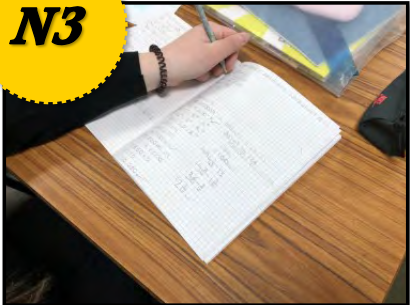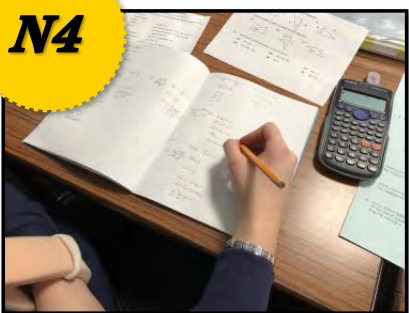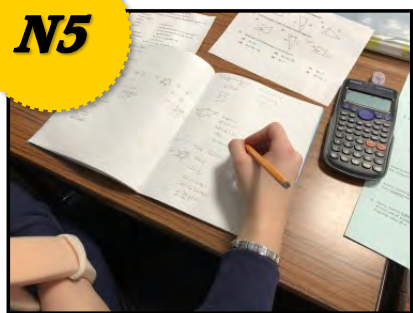National 3
What will I learn?
Manage Money and Data
In this Unit pupils will apply their maths and numeracy skills to work with money and data in real-life contexts. They will learn about percentages, budgeting and saving money, considering how much money is earned and different methods of saving. They will also learn how to read and draw different types of graphs in real-life contexts.
Shape, Space and Measures
In this Unit pupils will apply their maths and numeracy skills to work with different shapes and methods of measuring in real-life contexts. They will learn to work with lengths, weights, areas and volumes, changing measurements between different units. They will also learn how to continue patterns and give and follow directions set in real-life contexts.
Numeracy
In this Unit pupils will apply their maths and numeracy skills to complete number calculations in real-life contexts. They will learn how to solve number problems, including those with fractions, percentages and rounding to get an accurate answer.
How will I learn?
In class pupils will learn through individual and group work, practicing new skills so they can use them easily. On doing this they will get the chance to combine these skills in real life scenarios and problem solving. Homework will also be used to practise new, and existing, skills, and allow pupils the chance to show what they have learnt.
How will I be assessed?
Pupils will sit a test at the end of each Unit. All of these must be passed to gain a full SQA course award.
Career Opportunities
Maths is a skill used by everyone in everyday life and is used in many jobs including Financial Services, Engineering, Transport, construction, Science, Retail, Customer Services, Tourism, catering, Healthcare, Manufacturing, Administration, ICT Publishing, Marketing, Advertising, Armed Forces, Emergency services, Working with animals, Teaching, Child care, and many, many more.

National 4
What will I learn?
Expressions and Formulae
In this Unit pupils will expand their algebra skills, simplifying expressions, working with brackets, creating and substituting into expressions and formulae. They will also learn to calculate perimeters, areas and volumes, of different 2D and 3D shapes, as well as drawing and understanding patterns with rotational symmetry. To complete this unit, they will learn how to compare statistics using averages, graphs and probability.
Relationships
In this Unit pupils will continue to expand their algebra skills, focusing on straight line equations, solving them and rewriting them in different ways. They will also learn to use Pythagoras’ Theorem, Trigonometry, Scale Factors, and angle facts linked to parallel lines and the circle. To complete this unit, they will learn how to draw Scatter Graphs and draw the line of best fit of a set of data.
Numeracy
In this Unit pupils will apply their maths and numeracy skills to complete number calculations in real-life contexts. They will learn how to solve number problems, including those with negative numbers, fractions, percentages, proportion, ratio and rounding to get an accurate answer. They will also learn how to calculate time differences, distances, speed and change money between different currencies. To complete this unit, they will learn how to read and draw different types of graphs, read scales and calculate probability.
How will I learn?
In class pupils will learn through individual and group work, practicing new skills so they can use them easily. On doing this they will get the chance to combine these skills in real life scenarios and problem solving. Homework will also be used to practise new, and existing, skills, and allow pupils the chance to show what they have learnt.
How will I be assessed?
Pupils will sit a test at the end each Unit. All of these must be passed, along with the calculator and non- calculator Added Value Assessments at the end of the course, to gain a full course award.
The Added Value Assessment tests the pupils’ ability to integrate and apply the skills acquired in the 3 of the Units in unfamiliar situations.
Career Opportunities
Maths is a skill used by everyone in everyday life and is used in many jobs including Financial Services, Engineering, Transport, construction, Science, Retail, Customer Services, Tourism, catering, Healthcare, Manufacturing, Administration, ICT Publishing, Marketing, Advertising, Armed Forces, Emergency services, Working with animals, Teaching, Child care, and many, many more.

National 5
What will I learn?
Expressions and Formulae
In this Unit pupils will expand their algebra skills, simplifying expressions by removing brackets, factorising, completing the square and working with algebraic fractions. They will also learn to calculate the gradient of a straight line, arcs lengths and the area of sectors in a circle. To complete this unit, they will learn how to work with, and simplify, surds and indices.
Relationships
In this Unit pupils will continue expand their algebra skills, finding the equation of straight lines, solving equations and inequations, and working with quadratics. They will build on their Trigonometry skills, focusing on trigonometric graphs and equations. To complete this unit, they will learn how to find missing length & angles, and use scale factors to work with similar shapes.
Applications
In this Unit pupils will continue to work on expanding their use of Trigonometry, focusing to use the Sine Rule and Cosine Rule with Bearings. They will also learn how to work with Vectors, 3D coordinates, Percentage appreciations & depreciation, and more complex calculations with fraction and mixed numbers. To complete this unit, they will learn how to read and draw Boxplots, and use the Equation of a Straight line to find connections between sets of data.
How will I learn?
In class pupils will learn through individual and group work, practicing new skills so they can use them easily. On doing this they will get the chance to combine these skills in real life scenarios and problem solving. Homework will also be used to practise new, and existing, skills, and allow pupils the chance to show what they have learnt.
How will I be assessed?
Pupils need to sit and pass the external SQA exam in May to gain a course award. This will be made up of 2 papers, a calculator and a non-calculator paper. Pupils can opt not to sit the SQA exam in May, instead be certificated for the Units only. For this to happen they will need to have sat and passed all 3 Unit Assessments during the course of the year.
Career Opportunities
Maths is a skill used by everyone in everyday life and is used in many jobs including Financial Services, Engineering, Transport, construction, Science, Retail, Customer Services, Tourism, catering, Healthcare, Manufacturing, Administration, ICT Publishing, Marketing, Advertising, Armed Forces, Emergency services, Working with animals, Teaching, Child care, and many, many more.


